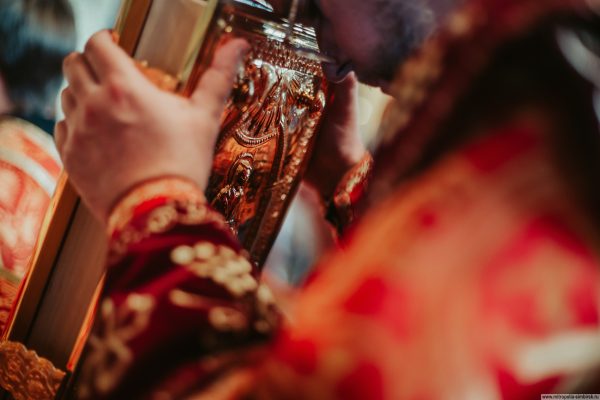I used to think that the Cross of Christ was something upon which we hung our sins so that we wouldn’t have to suffer for them later. That was a rather shallow view of it. Jesus made it more – He said that we would have to deny ourselves, pick up a cross and follow Him. I realized that the Cross had to move from Calvary into my heart. Well, that has been a struggle because while my heart wants to live forever and is grateful for all that Jesus did for me, the heart also wants to pursue its own pleasures, dreams, and ambitions. To have the Cross in my heart and the self-denial that follows is directly opposed to the fantasies of my life. For this reason, though sin is hard to bear, the Cross is very hard to bear.
In Galatians 2, St. Paul puts forward an astonishing idea. “I have been crucified with Christ; it is no longer I who live, but Christ who lives in me.” It’s one thing to believe that Christ died for me. Its another thing to say that I was crucified with Christ. St. John Chrysostom says that in these words he alludes to Baptism. In baptism, one dies to the old self and is freed from the tyranny of the past, the world, and one’s own ego. So many people struggle with themselves. They constantly complain about some failing, uncontrollable passion, a bad attitude, being judgmental, etc. It disturbs them that these failings and passions never seem to change though they struggle mightily with them.
Imagine if there was no “I” in the equation. It is no longer “I” who lives. If there was no “I”, then there would be nothing for the devil to attack. There would be no uncontrollable passions, no bad attitudes. There would certainly be no despair and no fear. There would be no temptations. As the old saying goes, “a dead man cannot sin.” Elder Porphyrios says the following:
“In the Church which possesses the saving sacraments there is no despair. We may be deeply sinful. But we make confessions, the priest reads the prayer, we are forgiven and we progress towards immortality, without any anxiety and without any fear. When we love Christ, we live the life of Christ. If, by the grace of God, we succeed in doing this, we find ourselves in a different state, we live in another, enviable state. For us there is no fear; neither of death, nor of the devil nor of hell. All these things exist for people who are far from Christ, for non-Christians. For us Christians who do His will, as the Gospel says, these things do not exist. That is, they exist, but when one kills the old self along with the passions and desires, one gives no importance to the devil or to evil. It doesn’t concern us. What concerns us is love, service to Christ and to our fellow man. If we reach the point of feeling joy, love, worship of God without any fear, we reach the point of saying, It is no longer I who live; Christ lives in me. No one can prevent us from entering into this mystery.”
How do we reach this state of joy, love, and worship of God without fear?
Foremost, it is with faith – faith that Christ died for me; faith that I no longer live; faith that it is Christ who lives in me; faith in all that He gives me so that He may live in me: Baptism, Holy Communion, the Bible, the Church, confession, etc. Faith that He will never leave me, nor forsake me, no matter what I do or how many times I fall.
Then we reach this state by theosis, by the process of salvation. By the Holy Spirit and the grace given to us, we work out our salvation in fear and trembling. We embrace the disciplines of faith, not to gain God’s favor nor do we do them to keep the rules. We do them so that we can reach that state of being where we know, and no longer doubt, that I no longer live, but it is Christ who lives in me.
Finally, it is by love that we come to the place where we are not only made in His image, which all people have. We attain His likeness as well. Since God is love, to look like Christ is to look like love itself. Love compels us to pick up His cross and follow Him. It is by love that I am crucified to the world and the world to me. It is love that makes the “I” go away. Then on Judgment Day, when God looks at me, it is not “I” that He will see. It is Christ in me that He will see.

















